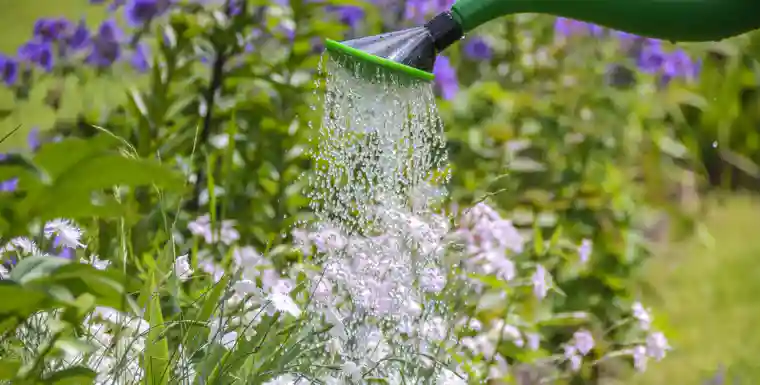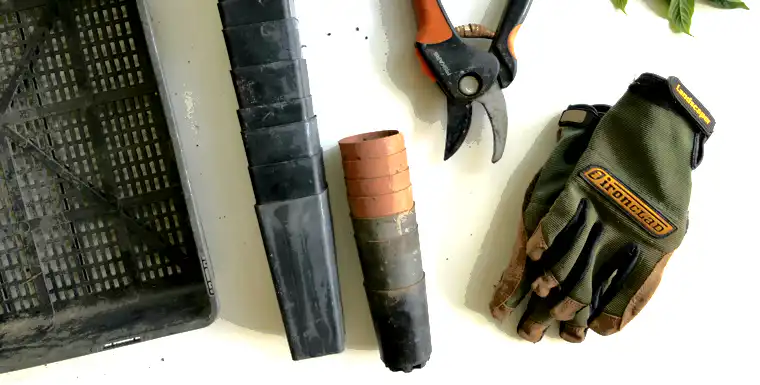Gardening is a rewarding endeavor, but it comes with its fair share of challenges. One of the most common issues gardeners face is the threat of fungal diseases that can harm or even destroy their plants. That’s where copper-based fungicides come into play. These fungicides are a powerful tool in the gardener’s arsenal, providing an effective defense against a wide range of fungal diseases. In this article, we’ll delve into the world of copper-based fungicides, exploring what they are, how they work, and why they might just be the best pesticide for your flowering plants.

Quick Links
What is Copper-Based Fungicide?
Copper-based fungicide is a type of pesticide that’s used to control fungal diseases in plants. As the name suggests, these fungicides are based on copper, a metal that, in dissolved form, penetrates plant tissues and helps control fungal diseases. Copper-based fungicides are often used as a preventative measure, applied before the presence of disease to be effective.
The Role of Copper in Fungicides
Copper, a trace mineral, is toxic to various fungi and bacteria. When these microorganisms come into contact with copper, it disrupts their metabolism and prevents them from growing and reproducing. This makes copper an effective ingredient in fungicides.
The Broad-Spectrum Nature of Copper-Based Fungicides
Copper-based fungicides are considered broad-spectrum because they work against a wide variety of fungal and bacterial diseases. These include blights, spots, mildews, and rusts that can affect a vast range of plants, from vegetables and fruits to ornamental plants and trees.
For gardeners, copper-based fungicides are an essential tool in the fight against plant diseases. By applying these fungicides, gardeners can protect their plants and ensure a healthy, productive garden. Whether you’re growing a vegetable garden, maintaining a landscape, or caring for houseplants, copper-based fungicides can play a crucial role in your plant care routine.

The Environmental Impact of Copper-Based Fungicides
While copper-based fungicides are beneficial, it’s important to use them responsibly. Copper is a heavy metal that can accumulate in the soil and potentially harm beneficial soil organisms. Therefore, these fungicides should be used as part of an integrated pest management strategy, and always according to the product’s label instructions.
Types of Copper-Based Fungicides

Copper-based fungicides come in various forms, each with its unique properties and applications. Let’s explore some of the most common types:
- Copper Hydroxide Fungicides: These fungicides are widely used due to their effectiveness against a broad spectrum of fungal diseases. Products like Kocide and Champion contain copper hydroxide as the active ingredient. They’re typically available in a wettable powder or liquid form that you mix with water before application.
- Organic Copper Fungicides: For gardeners who prefer organic solutions, there are copper fungicides approved for organic use. These products, such as copper soap fungicides, are made from naturally occurring copper minerals and are safe to use on organic gardens.
- Copper Sulfate Fungicides: Also known as bluestone, copper sulfate is one of the oldest fungicides and bactericides, used to control a variety of plant diseases. It’s often used in a form known as Bordeaux mixture, a combination of copper sulfate and hydrated lime.
- Copper Soap Fungicides: These fungicides, such as copper octanoate or copper salts of fatty acids, are less toxic to humans and animals. They’re effective against a range of diseases and are often used on fruits, vegetables, and ornamental plants.
Remember, each type of copper fungicide has its specific uses and application rates. Always read and follow the product label instructions to ensure you’re using the fungicide safely and effectively.

The Effectiveness of Copper-Based Fungicides
Copper fungicides are highly effective in preventing and controlling various fungal diseases. But how exactly do they work?
Copper ions, the active component in copper-based fungicides, have a multifaceted effect on fungal cells. They interfere with the enzyme system of the fungus, preventing it from performing essential functions, ultimately leading to the death of the fungal cells.
However, as noted by the Rutgers Cooperative Extension Fact Sheet, copper-based fungicides are preventative, not curative. This means they work best when applied before the fungal disease has a chance to establish itself. Once the disease is present, copper-based fungicides can prevent it from spreading further, but they can’t cure the parts of the plant already affected.
The effectiveness of copper-based fungicides also depends on proper application. Thorough coverage of the plant, including the undersides of leaves where fungi often first take hold, is crucial for the fungicide to work.
In the next sections, we’ll discuss how to use copper fungicides correctly and explore some DIY options for those who prefer a hands-on approach. Read on for more practical tips and advice on keeping your garden healthy and thriving.
Copper-Based Fungicides and Flowering Plants
Flowering plants, with their vibrant colors and delicate structures, are a joy to behold. However, they can also be susceptible to a variety of fungal diseases that can hinder their growth and mar their beauty. This is where copper-based fungicides come in.
Copper-based fungicides are often considered the best pesticide for flowering plants. They are effective against a wide range of diseases that commonly affect these plants, including powdery mildew, downy mildew, and black spot. By applying a copper-based fungicide, you can protect your flowering plants from these diseases and ensure they remain healthy and vibrant.
However, it’s important to remember that copper-based fungicides should be used as a preventative measure. Apply the fungicide at the first sign of disease, or even before if you know your plants are susceptible. Regular application, as directed by the product instructions, can help keep your flowering plants disease-free.
How to Use Copper-Based Fungicides

Using copper-based fungicides effectively requires a bit of knowledge and preparation. Here’s a step-by-step guide on how to use these fungicides:
- Choose the Right Fungicide: As we’ve discussed, there are several types of copper-based fungicides. Choose the one that’s best suited to your needs, considering factors like the type of plants you have and the diseases you’re trying to prevent.
- Read the Instructions: Always read the product label and follow the instructions carefully. This will provide information on how much fungicide to use, how to mix it (if necessary), and when and how to apply it.
- Prepare the Fungicide: If the fungicide needs to be mixed with water, do this just before you’re ready to apply it. This ensures the mixture is as fresh and effective as possible.
- Apply the Fungicide: Spray the fungicide on the plants, making sure to cover all parts, including the undersides of leaves. The best time to do this is early in the morning or late in the evening, when the sun won’t cause the fungicide to evaporate too quickly.
- Repeat as Necessary: Most copper-based fungicides need to be reapplied every 7-10 days, or after heavy rain. Check the product instructions for specific guidance.
Remember, safety is paramount when using any pesticide. Wear protective clothing, avoid inhaling the spray, and keep children and pets away during application.
DIY Copper-Based Fungicide

For those who enjoy a hands-on approach to gardening, making your own copper-based fungicide can be a rewarding and cost-effective project. Not only does it allow you to take full control over what goes into your fungicide, but it also gives you the satisfaction of knowing you’re using a product made with your own hands. Here’s a simple recipe you can try:
Ingredients:
- 1/2 cup of vinegar (5% acetic acid)
- 1 gallon of water
- 1 tablespoon of copper sulfate
Instructions:
- Dissolve the Copper Sulfate: Start by dissolving the copper sulfate in a small amount of warm water. This ensures that it’s fully dissolved and ready to be mixed with the other ingredients.
- Add the Vinegar: Once the copper sulfate is fully dissolved, add the vinegar to the solution. The vinegar helps to stabilize the copper and increase its effectiveness.
- Mix with Water: Now, mix this solution into the gallon of water, stirring well to ensure it’s fully combined.
- Apply to Plants: Use a spray bottle or garden sprayer to apply this mixture to your plants. Make sure to cover all parts of the plant, including the undersides of leaves, for the best protection against fungal diseases.
From personal experience, this recipe can be quite effective against a range of fungal diseases. It’s particularly useful for those who have a large garden and need a cost-effective solution. However, it’s important to remember that it’s a preventative measure and should be applied before the disease appears.
Also, keep in mind that safety is paramount when using any fungicide, even a homemade one. Always wear protective clothing during application, avoid spraying on windy days to prevent the mixture from getting into your eyes or being inhaled, and keep children and pets away from the area until the fungicide has dried.
In the end, making your own copper fungicide can be a rewarding project that protects your plants and deepens your connection with your garden. It’s a testament to the fact that sometimes, the best solutions are the ones we create ourselves.
The Pros and Cons of Copper-Based Fungicides
Like any product, copper fungicides have their advantages and disadvantages. Understanding these can help you make an informed decision about whether these fungicides are right for your garden.
Pros:
- Broad Spectrum: Copper-based fungicides are effective against a wide range of fungal diseases, making them a versatile tool for gardeners.
- Long-Lasting: Once applied, copper-based fungicides provide long-lasting protection against fungal diseases.
- Available in Organic Forms: For those who prefer organic gardening practices, there are copper-based fungicides available that are approved for organic use.
Cons:
- Can Be Harmful in Large Amounts: Copper is a heavy metal that can build up in the soil over time. This can be harmful to soil health and beneficial organisms.
- Potential for Plant Damage: If used excessively or in high concentrations, copper-based fungicides can cause damage to plant tissues.
- Not a Cure: Copper-based fungicides are preventative, not curative. They need to be applied before the disease appears to be effective.
In conclusion, while copper-based fungicides can be a highly effective tool in preventing and controlling fungal diseases, they should be used responsibly and as part of a broader integrated pest management strategy.
Frequently Asked Questions
Which fungicides are copper-based?
Copper-based fungicides come in various forms, including copper hydroxide, copper sulfate, and copper soap fungicides. Other types include copper octanoate and copper ammonia diacetate complexes. Each type has its unique properties and applications, so it’s important to choose the one that best suits your gardening needs.
When should you not use copper fungicide?
Copper fungicides should not be used excessively or in high concentrations as they can cause damage to plant tissues. They should also not be used as a curative measure for existing fungal diseases, as they are preventative in nature. It’s also important to avoid using copper fungicides in conditions where they might harm beneficial organisms, such as when bees are actively gathering pollen.
What are the cons of copper fungicide?
While copper-based fungicides are effective, they do have some drawbacks. They can be harmful to the soil and beneficial organisms if used in large amounts, as copper is a heavy metal that can build up in the soil over time. If used excessively or in high concentrations, they can also cause damage to plant tissues. Furthermore, they are preventative, not curative, meaning they need to be applied before the disease appears to be effective.
What plants benefit from copper fungicide?
Copper-based fungicides can be used on a wide range of plants, including vegetables, fruits, nuts, herbs, and ornamental plants. They are particularly effective against a range of diseases that commonly affect flowering plants, including powdery mildew, downy mildew, and black spot. Regular application of a copper-based fungicide can help keep these and other plants healthy and disease-free.





